How Much Does It Cost to Wire a 2,000 Sq Ft House?
Wiring a house is a crucial step in the construction process, ensuring that the home has a reliable and safe electrical system. Proper wiring is essential for powering all the electrical devices, appliances, lighting, and systems that modern homes rely on. Whether you’re building a new house or upgrading an existing one, understanding the costs associated with wiring is vital for effective budgeting and planning. This comprehensive guide will explore the costs involved in wiring a 2,000 sq ft house, breaking down the expenses into detailed categories to provide a clear understanding of what to expect.
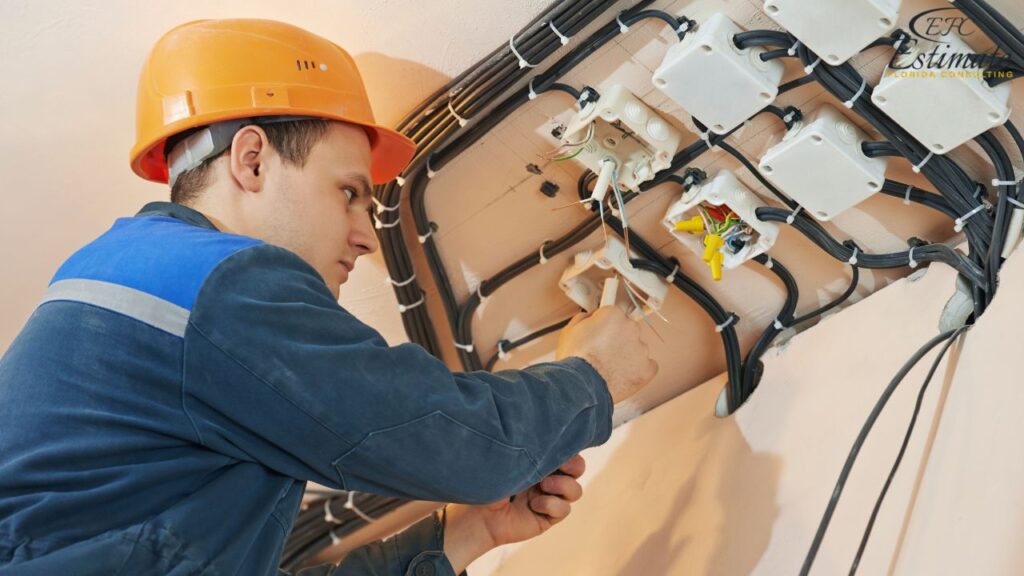
Average Cost Breakdown
The cost of wiring a 2,000 sq ft house can vary based on several factors, including the complexity of the wiring system, the quality of materials used, and local labor rates. On average, the cost can range from $11,375 to $35,425 or more. Here’s a general cost breakdown:
Construction Costs
Component | Estimated Cost (in dollars) |
Materials | $3,640 – $10,010 |
Labor | $6,825 – $20,020 |
Additional Costs | $910 – $5,395 |
Detailed Cost Breakdown
Materials
The cost of materials includes wiring, outlets, switches, circuit breakers, and other necessary components. High-quality materials can increase the cost but provide better durability and safety. Investing in good quality materials ensures that the electrical system will last longer and perform better. It also reduces the likelihood of future issues, saving you money on repairs and replacements in the long run. Using top-tier materials ensures that the system can handle the electrical load efficiently and reduces the risk of wear and tear over time. Durable materials also contribute to the long-term reliability of the electrical system, minimizing maintenance needs.
Cost Component | Estimated Cost (in dollars) |
Wiring and Cables | $2,340 – $4,550 |
Outlets and Switches | $650 – $1,560 |
Circuit Breakers | $650 – $2,340 |
Light Fixtures | $650 – $1,560 |
Other Components | $650 – $2,000 |
High-quality wiring and components not only improve safety but also ensure optimal performance and energy efficiency, making them a valuable investment for any homeowner. Choosing the right materials can also affect the aesthetic appeal of the electrical installations, ensuring they match the home’s design.
Labor
Labor costs include the time and expertise required to install the wiring, outlets, switches, and circuit breakers, as well as to ensure proper operation. The total labor cost can vary based on the complexity of the project and the rates charged by local electricians. Experienced electricians might charge more, but their work can ensure the job is done correctly and efficiently, reducing the risk of future problems. Labor costs also encompass the meticulous work of testing and certifying the new system to ensure it meets all safety standards and operates as intended. Skilled labor ensures that the rewiring process is seamless and that all components are installed correctly.
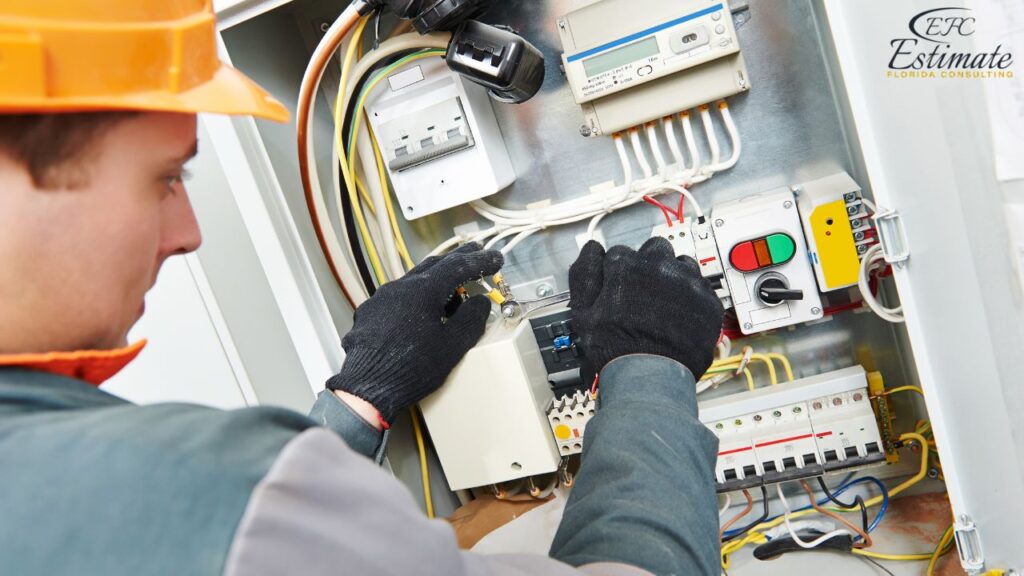
Cost Component | Estimated Cost (in dollars) |
Installation of Wiring | $3,250 – $6,500 |
Installation of Outlets and Switches | $1,300 – $3,250 |
Installation of Circuit Breakers | $650 – $1,950 |
Installation of Light Fixtures | $1,300 – $3,250 |
Testing and Inspection | $325 – $1,050 |
Investing in skilled labor is crucial for ensuring the safety and efficiency of the wiring project, as mistakes or shortcuts can lead to significant issues down the line. Professional electricians can also provide valuable advice on optimizing the electrical layout to enhance functionality.
Additional Costs
Additional costs can include permits, inspections, and any necessary repairs to walls or ceilings after the wiring is complete. These costs can vary depending on local regulations and the specific requirements of the project. Proper permits and inspections ensure that the work meets local codes and safety standards, avoiding potential legal issues and ensuring the safety of the home’s electrical system. These additional costs are essential to ensure the project is compliant with all regulations and that the home is safe for occupants. They also cover any unforeseen expenses that might arise during the project, such as structural modifications.
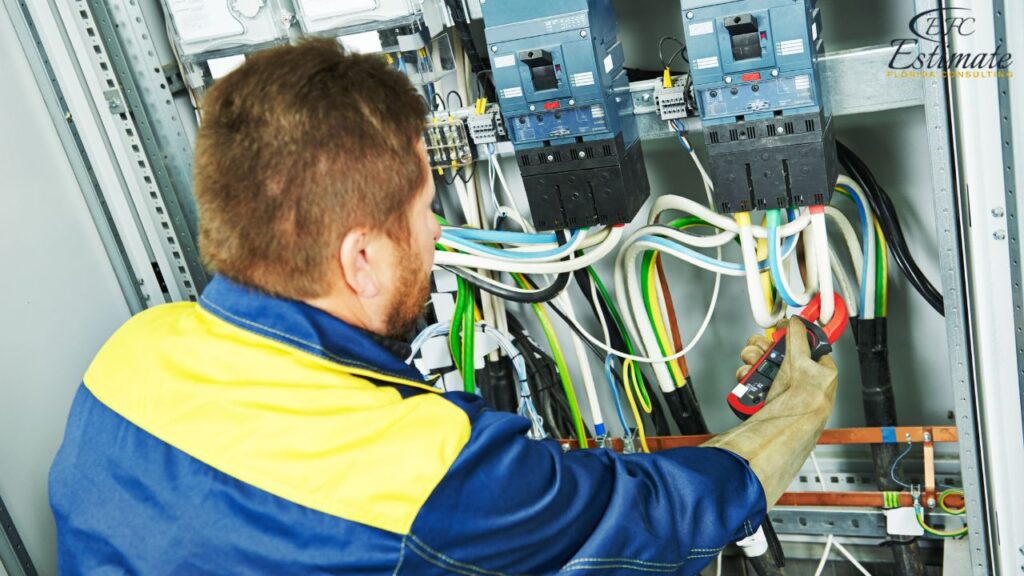
Cost Component | Estimated Cost (in dollars) |
Permits and Inspections | $390 – $1,560 |
Wall and Ceiling Repairs | $260 – $2,600 |
Miscellaneous Expenses | $260 – $1,235 |
Ensuring that all necessary permits and inspections are obtained is critical for the legal and safe completion of the wiring project, protecting both the homeowner and the property. These additional costs, while sometimes overlooked, play a crucial role in the project’s overall success and compliance.
90% More Chances to Win Projects With Our Estimate!
- Multi-Family Building
- Hotel Building
- Hospital Building
- Warehouse Building
- School & University Building
- High-Rise Building
- Shopping Complex
- Data Center Building
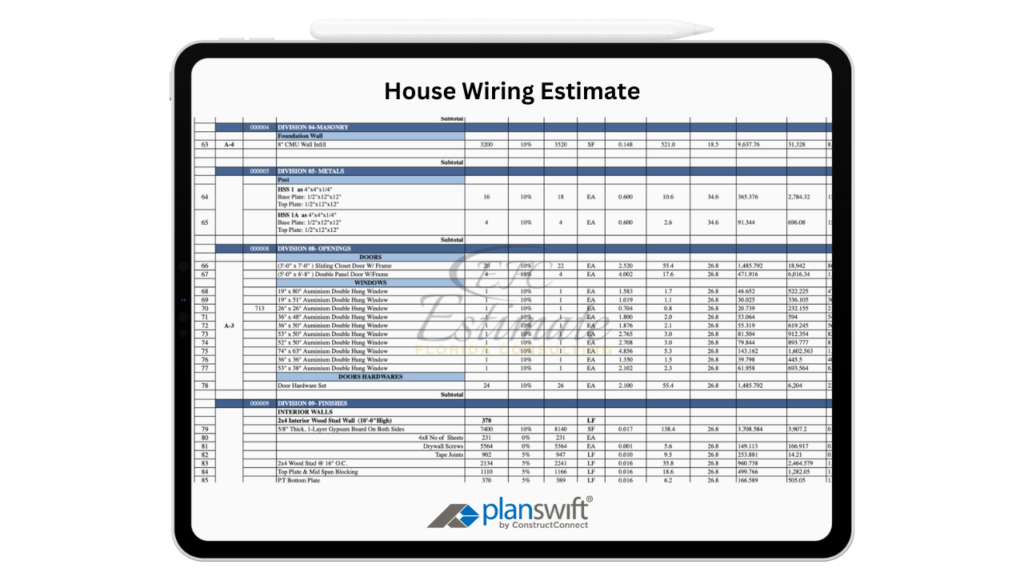
Factors Affecting the Cost of Wiring a House
Complexity of the Wiring System
The complexity of the wiring system can significantly impact the cost. Homes with more complex electrical systems, such as those with multiple circuits, advanced lighting setups, or integrated smart home systems, will require more work. Complex wiring systems can add to the labor costs due to the need for specialized skills and additional time. Each additional component or feature increases the intricacy of the work, requiring meticulous planning and execution. Installing complex systems might also involve coordinating with other contractors or specialists.
Complexity | Estimated Cost (in dollars) |
Basic Wiring | $11,375 – $18,200 |
Intermediate Wiring | $18,200 – $26,000 |
Complex Wiring | $26,000 – $35,425+ |
Complex wiring projects may involve additional labor for installing specialized components, such as dimmer switches, home automation systems, or advanced security systems. Each added feature or complexity can increase both the materials and labor required, thereby increasing the overall cost. More intricate systems require detailed planning and precise execution, often involving additional safety checks and certifications. Ensuring that all complex components are correctly integrated into the overall system is crucial for their functionality and reliability.
Local Labor Rates
Labor rates can vary significantly depending on the region and local demand for electricians. Urban areas with higher costs of living typically have higher labor rates. Additionally, the availability of skilled electricians can affect pricing, with more competitive markets potentially offering lower rates. It’s important to obtain multiple quotes from local electricians to ensure you’re getting a fair price for the work. Comparing quotes can also help identify any outliers and provide insight into the market rate for wiring services in your area.
Quality of Materials
The quality of the materials used for wiring can also impact the overall cost. Higher-quality materials, such as copper wiring instead of aluminum, can be more expensive but offer better conductivity and durability. Investing in high-quality outlets, switches, and circuit breakers can improve the safety and longevity of the electrical system. While premium materials may increase initial costs, they often provide better long-term value through improved performance and reduced maintenance needs.
Home Design and Layout
The design and layout of the home can affect wiring costs. Homes with open floor plans may be easier and less expensive to wire than homes with numerous walls and partitions. Additionally, multi-story homes may require more extensive wiring and labor to ensure proper distribution of electrical circuits. The physical layout of the home can also impact accessibility, influencing the ease and cost of installation. Proper planning and design can help optimize the wiring process, reducing labor time and potential complications.
Benefits of Proper House Wiring
Investing in quality wiring for your house offers several benefits:
Safety
Proper wiring reduces the risk of electrical fires and other hazards. It ensures that all electrical connections are secure and that the system can handle the electrical load without overheating. Modern wiring materials and techniques meet current safety standards, providing greater reliability and minimizing potential safety issues. This upgrade can prevent accidents and protect your family and belongings.
Increased Capacity
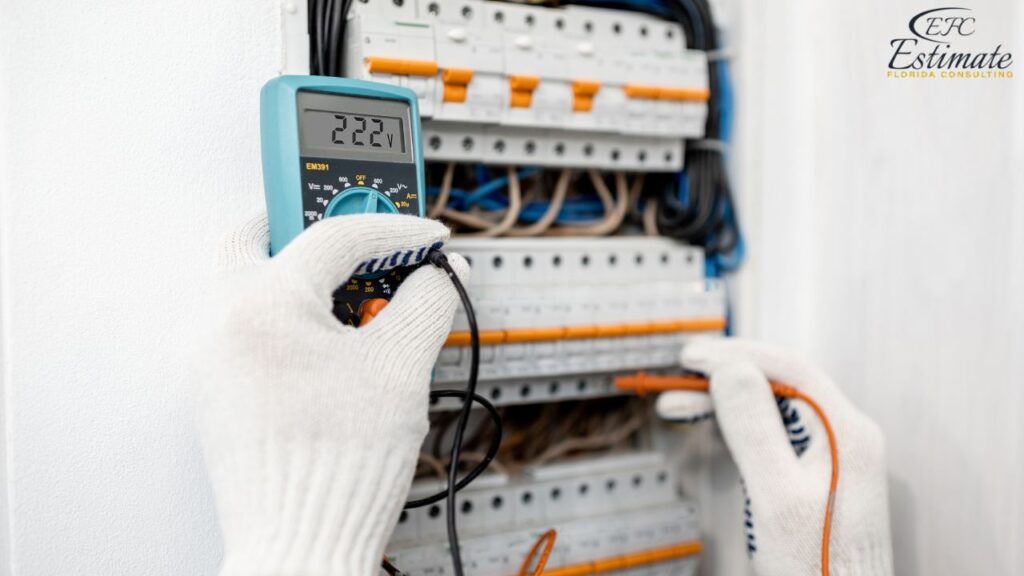
A well-designed electrical system can handle the demands of modern appliances and electronics, preventing overloaded circuits and ensuring overall functionality. This is especially important as homes today use more electrical devices than ever before. An upgraded system can support more advanced and energy-intensive appliances.
Energy Efficiency
Updated wiring can improve the energy efficiency of your home by reducing power loss and ensuring efficient operation of electrical systems. High-quality wiring minimizes energy loss through heat dissipation and electrical resistance, helping you save on energy costs. Energy-efficient systems reduce waste and make your home more sustainable.
Property Value
Proper wiring can increase the value of your property, making it more attractive to potential buyers. A modern electrical system indicates that the property is safe, reliable, and less likely to require costly repairs. This can be a significant selling point in the real estate market. A well-wired home assures buyers of fewer maintenance issues and better overall quality.
Tips for Managing Wiring Costs
Plan and Budget Carefully
Developing a detailed plan and budget before starting the wiring process is essential. Consider all potential costs, including materials, labor, permits, and additional expenses. A comprehensive budget can help avoid unexpected expenses and keep the project on track. Including a contingency fund for unforeseen issues can provide financial flexibility. A well-thought-out budget ensures that all aspects of the project are considered and accounted for. Detailed planning helps prevent overspending and ensures that resources are allocated efficiently throughout the project. A comprehensive plan also allows for better coordination among contractors, reducing the likelihood of delays and miscommunications.
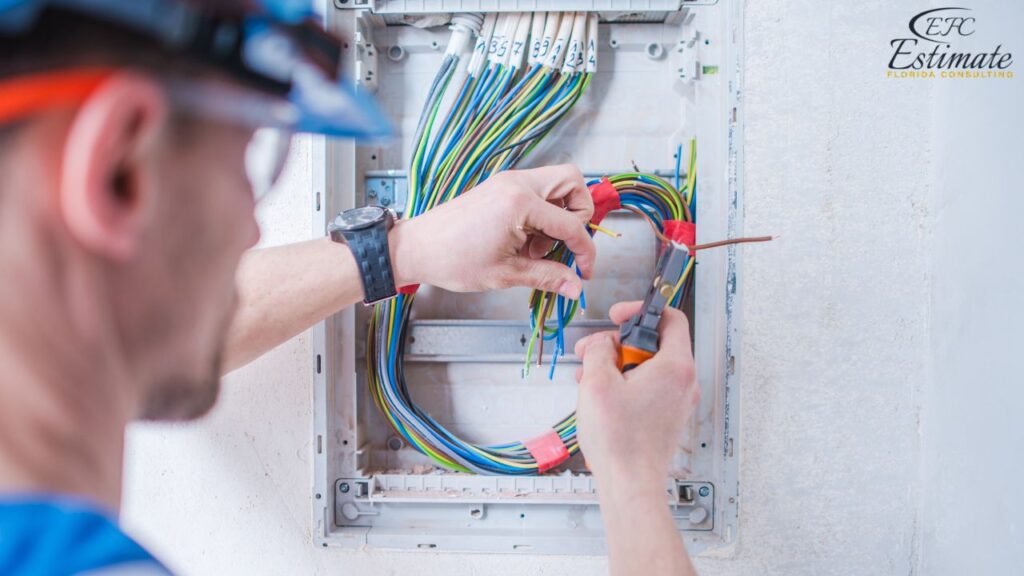
Choose the Right Contractor
Selecting a reputable and experienced electrician can make a significant difference in managing costs. Obtain multiple quotes, check references, and ensure the contractor has experience with similar projects. A reliable contractor can help identify cost-saving opportunities and manage the project efficiently. Contracts should clearly outline the scope of work, timelines, and payment schedules to avoid misunderstandings. Choosing the right contractor ensures high-quality work and efficient project management. An experienced contractor can also provide valuable insights into optimizing the electrical layout to enhance functionality and reduce costs.
Opt for Standard Designs
Using standard designs and materials can help reduce costs. Custom designs and high-end materials can quickly increase the budget. Working with an architect or designer to develop a cost-effective yet functional design can help manage expenses. Simplifying the design can reduce the need for custom materials and specialized labor, making the project more budget-friendly. Standard designs often benefit from streamlined construction processes and readily available materials. Opting for standard designs can also expedite the construction process, reducing labor costs and minimizing potential delays.
Monitor the Project Closely
Regularly monitoring the wiring project can help identify and address any issues promptly. Staying involved in the project ensures that it stays on schedule and within budget. Regular site visits and progress meetings with the contractor can help keep the project on track. Clear communication between all parties involved can prevent delays and ensure that any changes are managed efficiently. Close monitoring allows for proactive problem-solving and ensures the project meets the expected quality standards. Effective oversight helps ensure that the construction adheres to the planned schedule and budget, preventing costly overruns.
Download Template For Electrical Project Breakdown
- Materials list updated to the zip code
- Fast delivery
- Data base of general contractors and sub-contractors
- Local estimators

Plan for Contingencies
Including a contingency budget of 10-20% of the total wiring cost can help cover unexpected expenses. This ensures that you are prepared for any unforeseen issues that may arise during the wiring process, such as discovering existing structural issues that need to be addressed. Having a contingency plan can prevent project delays and financial strain. A contingency budget provides a financial cushion to handle surprises without derailing the project. Being prepared for contingencies ensures that the project can continue smoothly even when unexpected challenges occur.
Conclusion
Wiring a 2,000 sq ft house is a significant investment that requires careful planning and budgeting. By understanding the various costs involved and the factors that influence these costs, you can make informed decisions and ensure the success of your wiring project. Investing in high-quality materials, working with experienced professionals, and planning for contingencies can ensure a successful and cost-effective wiring project. Whether you’re building a new home or upgrading an existing one, proper planning and execution are key to achieving the desired results and ensuring the safety and efficiency of your home’s electrical infrastructure. By taking a proactive approach to your home’s electrical system, you can enhance safety, improve functionality, and increase property value, ensuring a better living environment for years to come. Properly managing the wiring process not only ensures compliance with safety standards but also maximizes the long-term benefits of the upgrade.
FAQs
The cost typically ranges from $11,375 to $35,425 or more. This includes expenses for materials, labor, and additional costs such as permits and inspections. Factors like the complexity of the wiring system, quality of materials, and local labor rates can also affect the total cost.
The major components include materials, labor, and additional costs such as permits, inspections, and any necessary repairs. Each component plays a crucial role in the overall wiring process and impacts the total cost.
The cost of materials can range from $3,640 to $10,010. This includes wiring, outlets, switches, circuit breakers, light fixtures, and other necessary components. High-quality materials ensure better durability and safety, providing long-term reliability and minimizing future issues.
The estimated costs are:
- Wiring and Cables: $2,340 – $4,550
- Outlets and Switches: $650 – $1,560
- Circuit Breakers: $650 – $2,340
- Light Fixtures: $650 – $1,560
- Other Components: $650 – $2,000
Labor costs cover the installation of wiring, outlets, switches, and circuit breakers, as well as testing and inspection to ensure proper operation. Skilled labor is essential for accurate and safe installation, ensuring the system meets all safety standards and operates efficiently.
Homes with complex electrical systems, such as advanced lighting setups or integrated smart home systems, require more work and higher costs. Complexity adds to labor time and the need for specialized skills, increasing overall expenses.
Labor rates can vary significantly depending on the region and local demand for electricians. Urban areas with higher costs of living typically have higher labor rates. Obtaining multiple quotes from local electricians can ensure you’re getting a fair price.
Google Reviews



Process To Get Electrical Cost Estimate Report
Here I am going to share some steps to get electrical cost estimate report.
-
You need to send your plan to us.
You can send us your plan on info@estimatorflorida.com
-
You receive a quote for your project.
Before starting your project, we send you a quote for your service. That quote will have detailed information about your project. Here you will get information about the size, difficulty, complexity and bid date when determining pricing.
-
Get Estimate Report
Our team will takeoff and estimate your project. When we deliver you’ll receive a PDF and an Excel file of your estimate. We can also offer construction lead generation services for the jobs you’d like to pursue further.

